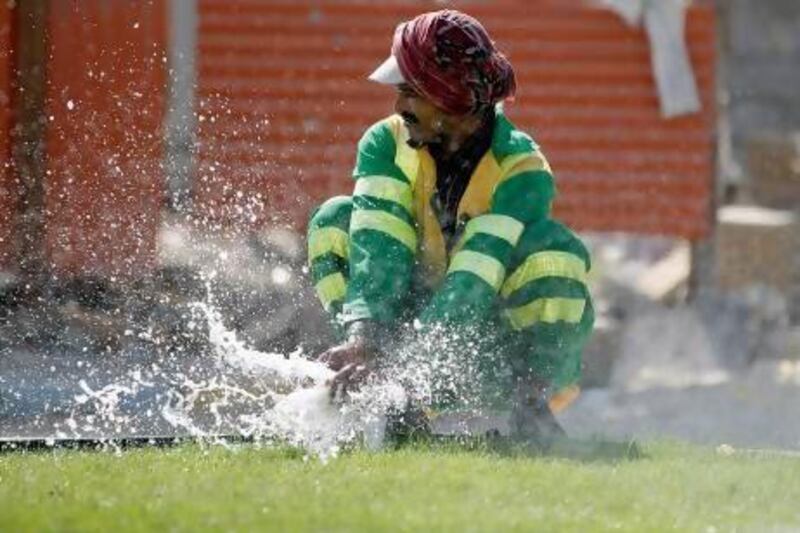DUBAI //Thousands of workers on construction sites, road projects and at labour camps are being taught to identify the tell-tale signs of potentially deadly heat exhaustion.
The awareness campaign began last month and has already reached nearly 40,000 workers.
It is being organised by medical professionals from the National Trading and Pharmaceutical Establishment (NTPE) as part of their corporate social-responsibility mandate.
"We teach them basic first-aid measures so they can provide immediate and necessary relief in case a co-worker collapses," said Feroz Babu, a supervisor at the NTPE who has been conducting the workshops.
"This is just to provide support before medical help arrives. We also teach them to watch out for danger signs like muscle cramps, severe headache, drowsiness, nausea and dizziness, because if they are not careful and do not ask for help it could lead to accidents."
Construction workers, plumbers, mechanics, facilities managers, engineers and officers have gathered in Dubai, Abu Dhabi, Al Ain, Ras Al Khaimah, Fujairah, Sharjah and Ajman - in large halls or on or near building sites - to watch a short animated safety film, presented in Hindi with Arabic subtitles.
After the presentation, the men are given orange safety leaflets carrying the vital message: "Heat can lead to death. Look out for excessive sweating, weakness. Go to a cool place, ask for help, keep your body cool with a cold towel or cloth."
The leaflets are in five Indian languages, Arabic, Urdu and English.
The main concern of those attending the workshops was "to know how to help a colleague who is exhausted", said Sayeed Irfan, the group head of health, safety and quality at Transguard, a company that manages facilities, maintenance and airport services.
As part of the NTPE programme, workers are taught to move co-workers who faint to a shaded, cool place, sprinkle water on their faces, loosen their clothes and call for help.
The workshops warn workers of the effects of severe dehydration - the bodies can lose so much water it stops perspiring and its temperature rises to a dangerous level.
The message is particularly important for workers whose outdoor work cannot be stopped, such as those at the airport. Mr Irfan said his company's workers were asked to take regular breaks and drink plenty of liquids containing electrolytes.
This summer the company is introducing cooling bands that staff can wear around the neck to keep body temperatures lower.
"Many workers ask for a shift change to work at night," he said. "We advise them to take regular rest and we change the rotation shifts to make it easier on the new batches that come in the afternoon.
"We can't stop working in summer so we have to manage work and safety as the humidity levels increase."
Dhiraj Kumar, a health and safety manager with the building company Impregilo in Abu Dhabi, praised the campaign's use of video.
"The workers may forget words but they remember videos," he said. "They remember to eat fruits and to drink water in regular intervals even if they are not thirsty.
"We organise more such meetings during the summer and give them safety tips about the hazards they should be careful about."
Mr Kumar believes more heat-safety leaflets should be distributed with the emphasis on pictures.
"There are so many workers from different countries that it would work better if the safety leaflets are pictorial," Mr Kumar said. "Then it doesn't matter what language they speak because the pictures will remain in their memory."
Jagat, a carpenter, attended a meeting with 50 workers at a power substation in Abu Dhabi this week.
"I worry about feeling dizzy and getting headaches when it is so hot it is blinding," he said. "We make sure we wear a monkey cap, a helmet, glasses and cover our full face and body so that sand or light cannot enter and affect us. But sometimes it gets so hot that I drink two litres of water in one hour."
The campaign will continue all summer across the country.







